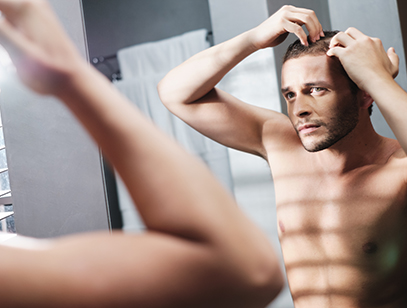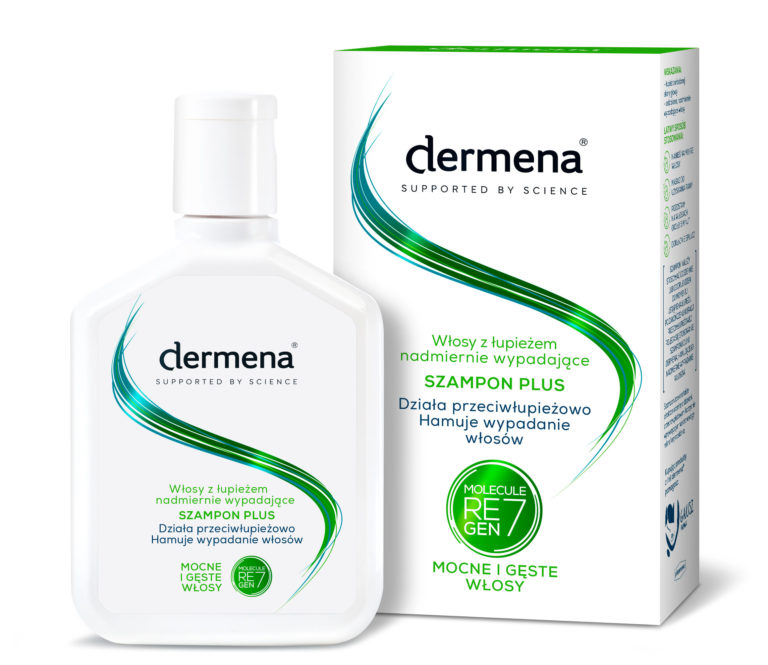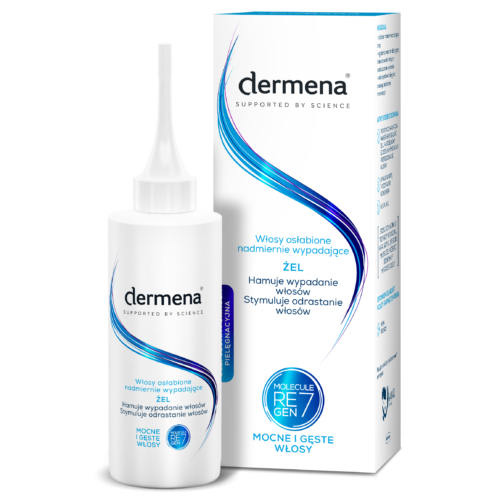Scalp dandruff

Dandruff is one of the most common scalp problems. It affects about 5-10% of the general population, predominantly male. However, it occurs mostly in people between 10 to 20 years of age, in whom the incidence of dandruff is estimated for up to 50%. The presence of dandruff is an aesthetic problem, but above all it can be a sign of a serious health problem and should not be underestimated. Dandruff is an excessive scaling and flaking of the scalp with less (dry dandruff) or more severe (greasy dandruff) seborrhea. Scaling is constant and normal process that lasts for about 28 days on a healthy skin and remains unnoticed. In case of dandruff this process is shortened up to 7 days and exaggerated, leading to the formation of visible flakes – scales. The scales may be dry and silvery grey (dry dandruff) or greasy and yellow-brown (greasy dandruff). Dry dandruff mainly affects adolescents and greasy dandruff mainly adults. At the early stages of dandruff scales present on the top of the head and spread on the sides of the scalp. The skin is usually not inflamed and people do not report any complaints. Scales separate from the skin either spontaneously or after washing or combing and they can gather amidst the hair or drop on clothes. Dry dandruff is not associated with changes in the structure and function of hair or excessive hair loss as compared to physiological loss rate of approximately 100 hairs per day. Untreated dry dandruff may however transform into more inconvenient greasy dandruff. It is characterized by larger, greasy and adherent to the scalp flaking scales. It is accompanied by inflammation of the scalp, severe itching and seborrhea. In its curse it can lead to hair thinning and excessive hair loss. Untreated greasy dandruff may result in so called seborrheic alopecia.
Causes of dandruff
Knowledge about the factors responsible for the development of dandruff is the basis for prevention and treatment. Dandruff is a chronic and recurrent disease. It may appear without the apparent cause as factors contributing to its development are not often realized. They may be divided to internal and external factors. Among the first there are: hormonal disorders, general physical condition, and stress and genetic predisposition. Occasionally, dandruff can be accompanied by other skin conditions, such as psoriasis, mycosis or atopic dermatitis. Among the external factors there are: improper hair products, inadequate rinsing of the scalp, poor personal hygiene (not washing the hair often enough), cold weather, dry indoor heating, air conditioning, unbalanced diet. These factors cause irritation of the scalp what makes it more sensitive than healthy skin and prone to blastomycotic fungal infection with Malassezia furfur - Pityrosporum ovale. Currently, it is believed to be crucial to the formation of dandruff. The additional irritant factor makes it become pathogenic and disrupt physiological balance of the skin. Excessive yeast growth of Pityrosporum ovale causes secretion of enzymes – lipases, proteases, phospholipases – causing irritation and increased inflammation with flaking and scaling of the scalp – dandruff. Clusters of white, shedded skin cells from the scalp are not only an aesthetic problem. Untreated dandruff stimulates further activity of Pityrosporum ovale, leading to inflammation of the scalp and weakened hair follicles which in consequence causes excessive hair loss.
How to deal with dandruff?
Dandruff, particularly greasy, should not be underestimated and you should consult with dermatologist who will choose the appropriate treatment. Getting rid of dandruff is the first step to healthy hair. However, it requires patience and regularity. To obtain satisfactory effects, you should fight the cause of dandruff – Pityrosporum ovale. There are many shampoos on the market that offer such an activity, e.g. dermena® plus , which thanks to the use of two active substances not only fights dandruff, but also protects the skin against irritations and strengthens the hair follicle to stimulate hair growth. Adjunctive measure is also frequent shampooing, particularly in greasy dandruff, in order to remove excess sebum and scales. To prevent recurrence it is recommended to use anti-dandruff shampoo once a week for at least three months. In prophylaxis a special emphasis is put on avoiding external factors irritant to the skin, especially inappropriate cosmetics and over-use of styling products. Important role in the prevention of dandruff belongs to diet high in fatty acids, group B vitamins and zinc. These components can be supplied to the body as dietary supplements (e.g. dermena® complex).
Recommended products
dermena® PLUS SHAMPOO
- fights dandruff
- reduces hair loss
dermena® GEL
- reduces hair loss
- stimulates hair growth






